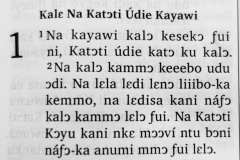A renewal of interest in translating the Bible into all languages started in 1800 with the creation of Bible Societies in many countries. In addition to the work of the Bible Societies, throughout the 1800s and 1900s missionaries translated the Bible into many languages for the first time. Wycliffe Bible Translators joined this movement in the 1930s with a focus on more remote and smaller languages. However, Wycliffe’s approach was to translate only the New Testament. In more recent years, they also translate some Old Testament books too. But Wycliffe has been involved in the translation of only a small number of whole Bibles. Wycliffe’s choice to give priority to the New Testament reflects the preference which Western Christians have for the New Testament.
Western Christians comprise most of Wycliffe’s staff and financial supporters. For many Western Christians the Old Testament (or at least large portions of it) seems irrelevant or not understandable. It seems to me that the face that the Old Testament is perceived as irrelevant accounts for much of the reason why Western missionary translators have tended to translate on the New Testament. Recently, there is renewed interest in translating the Old Testament. Those promoting more translation of the Old Testament in Africa often cite two reasons:
- All Scripture is inspired by God, not just the New Testament
- African cultures bear a lot of similarities to the Old Testament so African’s prefer it. One study of sermon texts in Nigeria found that over 80% came from the Old Testament.
One would think that the first argument – that all Scriptures is inspired, not just the New Testament – would be enough for translators and their financial supporters. But it has not been.
While the second reason – the cultural similarities between the Old Testament and African culture – is true, it doesn’t carry much weight, not even with me. I can like something without that being what I need.
I plan to write a series of blog posts giving other reasons why translation of the whole Old Testament, or at least significant parts of it, it crucial for the health of the church in Africa, and why it is absolutely necessary for African Christians to flourish in their faith.
I will not be treating the two reasons above because I will be assuming that they are valid, the first one especially. I will not be treating other reasons for translating the Old Testament, like:
- It is mostly in the Old Testament that we learn about God’s character
- Parts of the New Testament are impossible to understand without reference to parts of the Old
Those propositions are true and important, but others have written about them. So I will be limiting myself to one proposition
God has revealed himself in the Old Testament in ways that give his comfort, encouragement and instruction for many of the most burning issues facing African Christians, while the New Testament has much less to say on those burning issues.
In other words, the Old Testament is not just relevant to much of the context in Africa, it contains what God says about things which are not the common experience of Western Christians in ways that the New Testament does not. God has reached out to all his people with revelation dealing with their most pressing issues of life and faith, so that they could love and follow him in everything. We should not, therefore, translate only the parts in which God addresses our issues, but also the parts where he addresses the issue of the people for whom we are translating.
The issues to be covered are:
- Living in conflict and war
- Living with corruption and oppression
- Living with ethnic strife and tensions
- Living with poverty
- Living surrounded by traditional religion



Looking forward to reading your posting on OT translation
God’s best to you and Dayle
Ken (and Wilma) Van Schelven
LikeLike
Pingback: Why the Old Testament – Traditional Religion | Heart Language